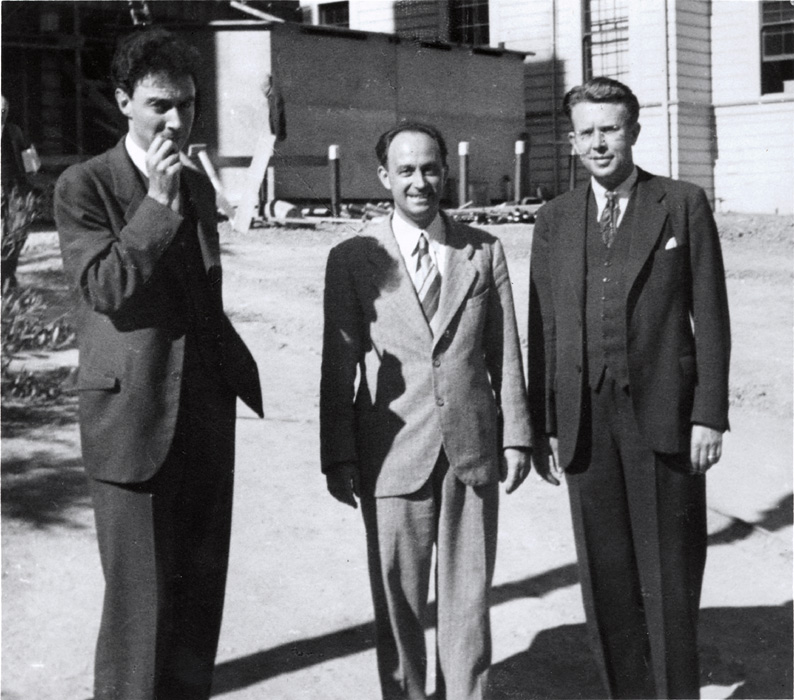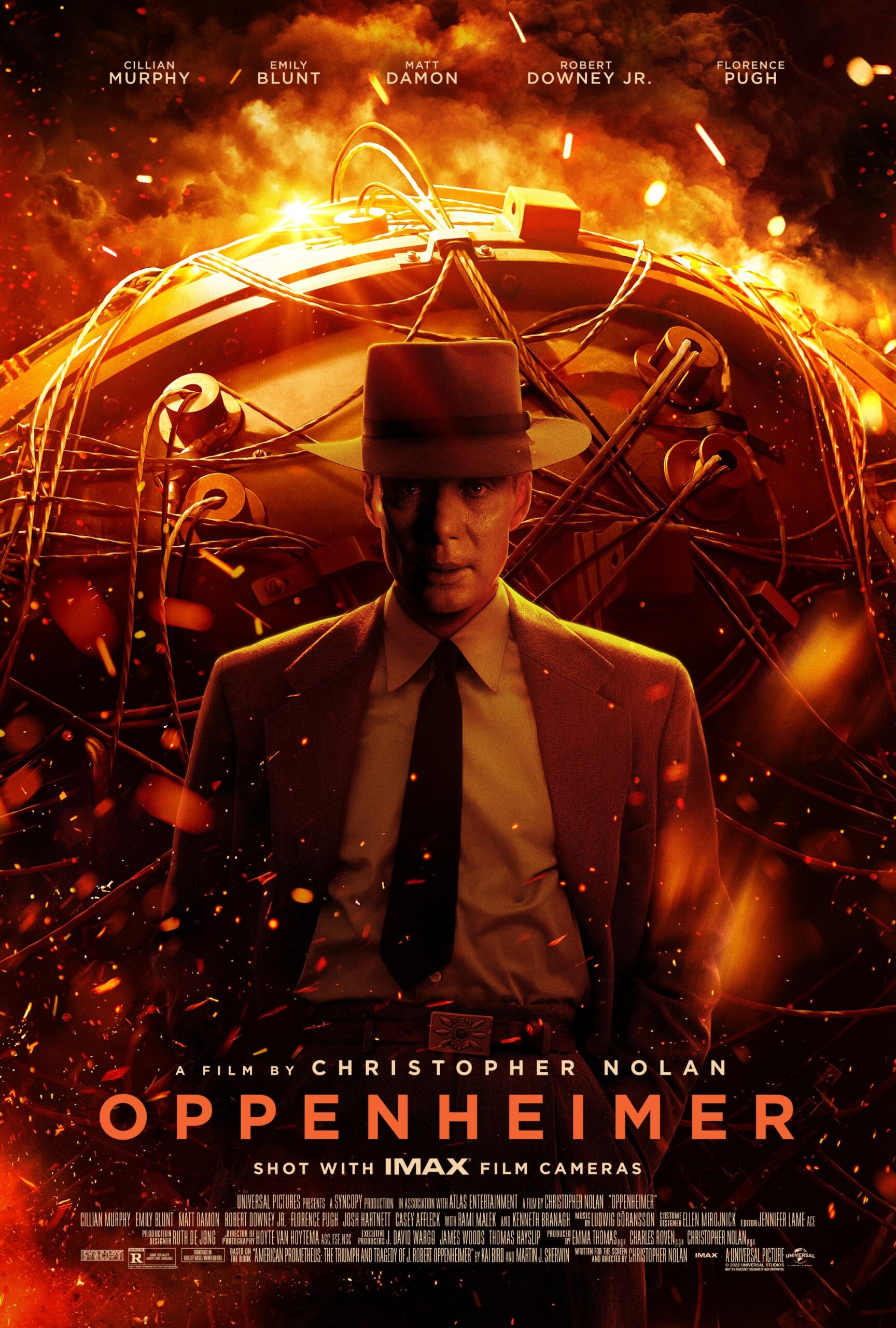
Oppenheimer
On the Same Page gives new students (and everyone else) at Berkeley something in common to talk about: a work that has changed the way we view the world. This year’s work, selected especially for the fall 2024 incoming class, is the film Oppenheimer.
Christopher Nolan’s Academy Award–winning film follows the spectacular rise and fall of J. Robert Oppenheimer’s career, beginning in the fall of 1929 when he arrived at Berkeley as an assistant professor in the physics department at the age of 25. The years he spent at Berkeley were a defining moment for the young professor and future father of the atomic bomb: here, he met close friends and collaborators, established his reputation as a charismatic public intellectual, and began his political awakening.
Our student reviewers were “fascinated by the questions the film raises about the value of technology” and “the role of academia in war.” Oppenheimer will change the way you see and think about UC Berkeley and our campus’s place in history and the world.
How to Watch
Stream Oppenheimer for free through UC Berkeley Library (CalNet authentication required). New students will have access to streaming through UC Berkeley Library starting August 21, 2024.
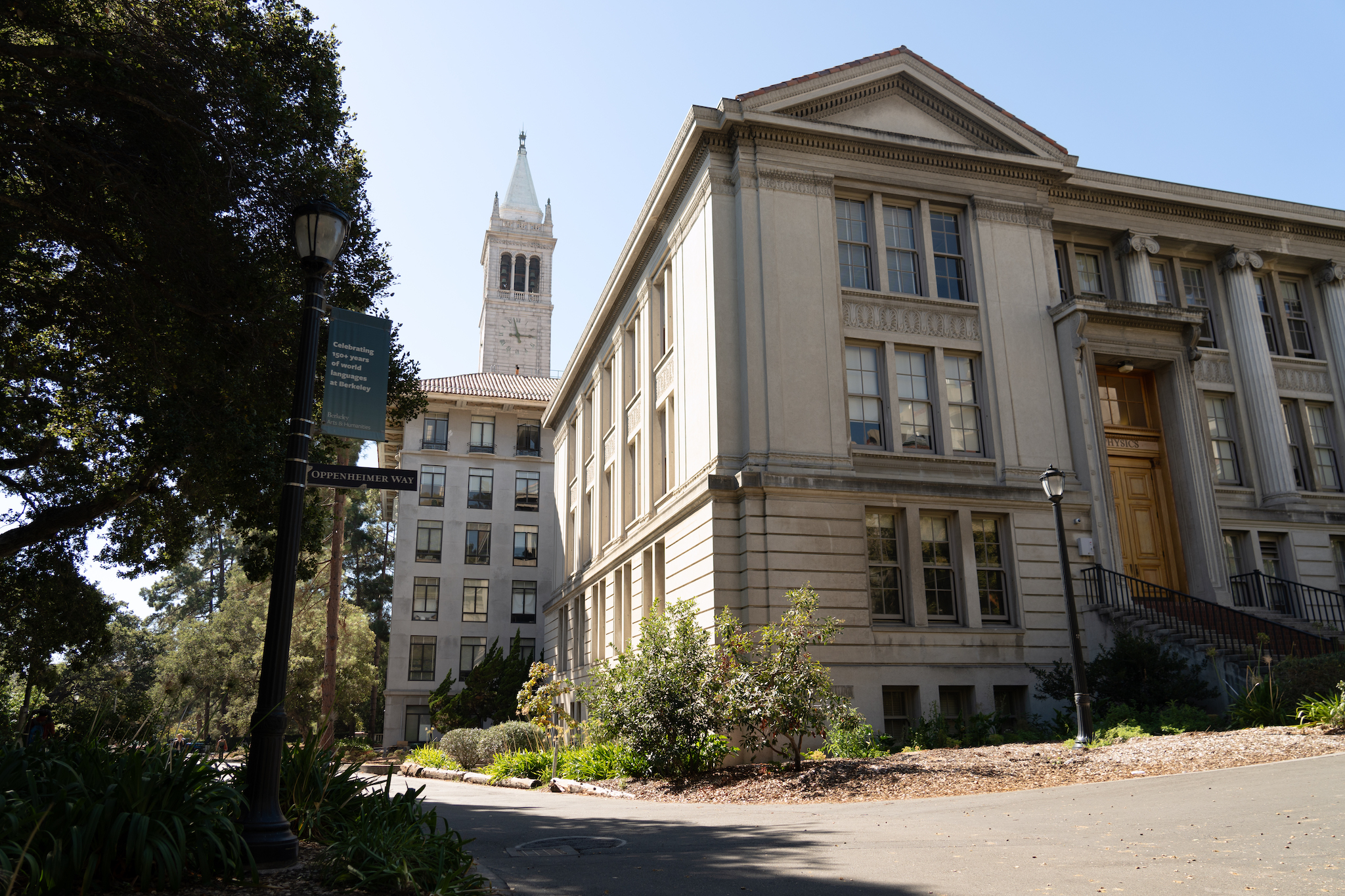
Events
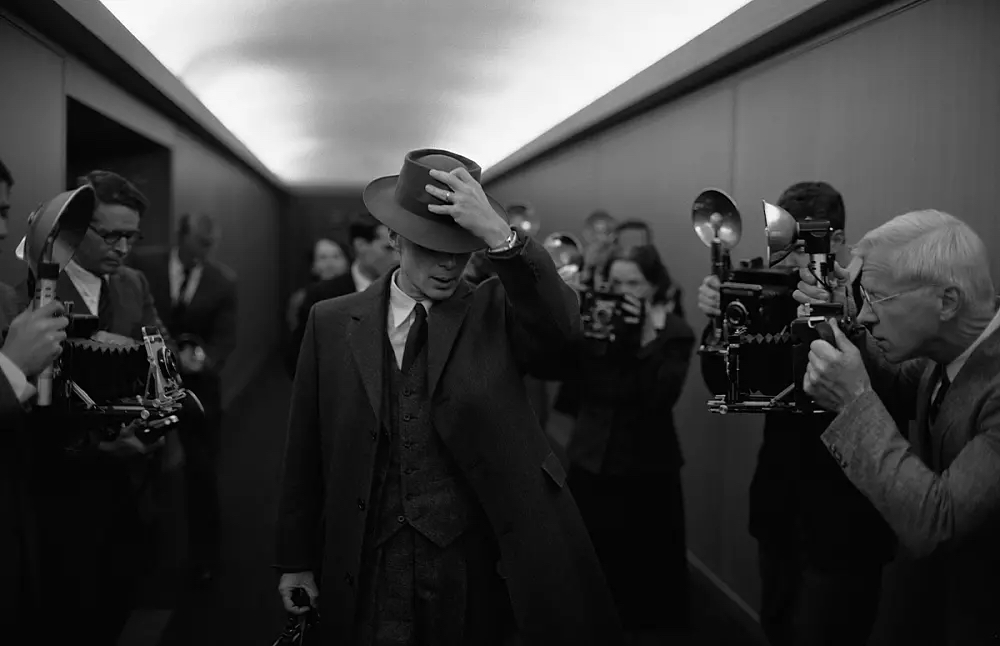
Free UC Berkeley Screening: Oppenheimer
Wednesday, September 4, 2024 | 5:00 PM (180 mins) | BAMPFA
Sunday, September 8, 2024 | 1:00 PM (180 mins) | BAMPFA
Christopher Nolan
United States, United Kingdom, 2023
These screenings are only open to UC Berkeley students, staff, and faculty as part of the On the Same Page program. Free tickets will be available at the admissions desk one hour prior to showtime. Attendees must present their Cal 1 Card to receive their ticket.
On the Same Page presents: What is Oppenheimer Good For? Panel Conversation and Q&A
Thursday, September 5, 2024 | 4:00–5:00 PM | Zellerbach Playhouse
Join us for a thought-provoking, interdisciplinary panel and Q&A discussion about the film Oppenheimer. We’ll hear from historians, physicists, and a filmmaker about Christopher Nolan’s Academy Award–winning film. Reception to follow.
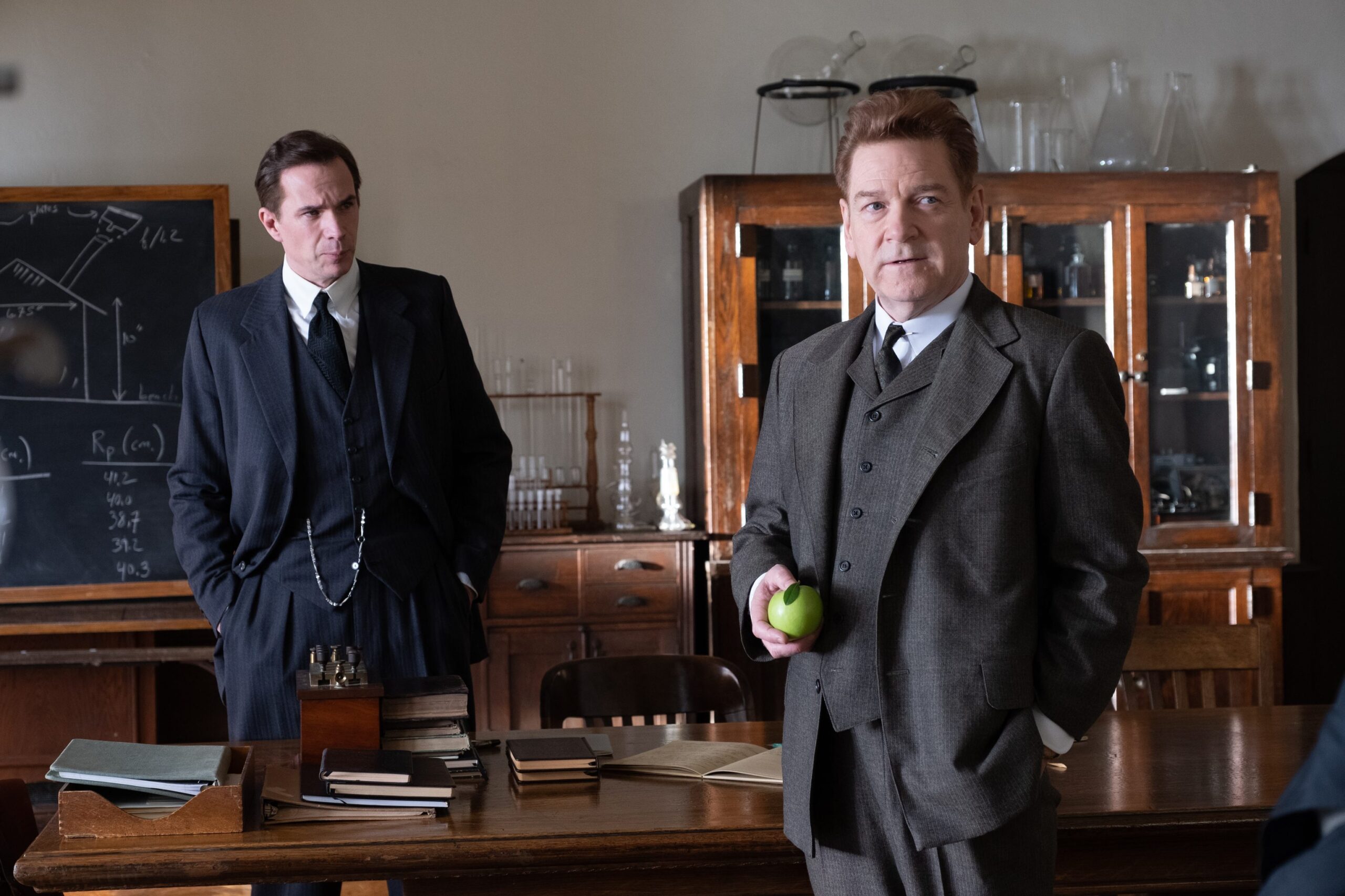
Beyond “Oppenheimer”
Friday, September 27, 2024 | 12:30–2:00 PM | 470 Stephens Hall
How can we place Oppenheimer into a larger frame and go beyond the story told by the film? What “more” can we learn beyond the film? We’ll ask, what is the value of technology and what is the role of academia and scientists in war? How does the inclusion of indigenous voices reframe this history and its meaning? What is the tension between how popular narrative works and how science worked at the time? How did parts of this scientific culture shape foundations for the counterculture of the 1960s? What do we all make of the cultural phenomenon of the “Barbenheimer” summer? Why, in 2023, were these the two particular historical touchstones from the mid-century United States that the public found so useful and salient?
Panelists: Fred Turner, Harry and Norman Chandler Professor of Communication, Stanford University; Dmitri Brown, Assistant Professor of History, UC Berkeley; Jeannette Estruth, Assistant Professor of History, Santa Clara University, and Faculty Associate at the Harvard Berkman-Klein Center for Internet and Society; and Deborah Poskanzer, Independent scholar and editor, Issues in Science and Technology
Moderator: Sandra Eder, Associate Professor of History, UC Berkeley; Director, Center for Science, Technology, Medicine, and Society (CSTMS)
This event is co-presented by the On the Same Page program and the Center for Science, Technology, Medicine, and Society (CSTMS). Lunch will be provided while supplies last.
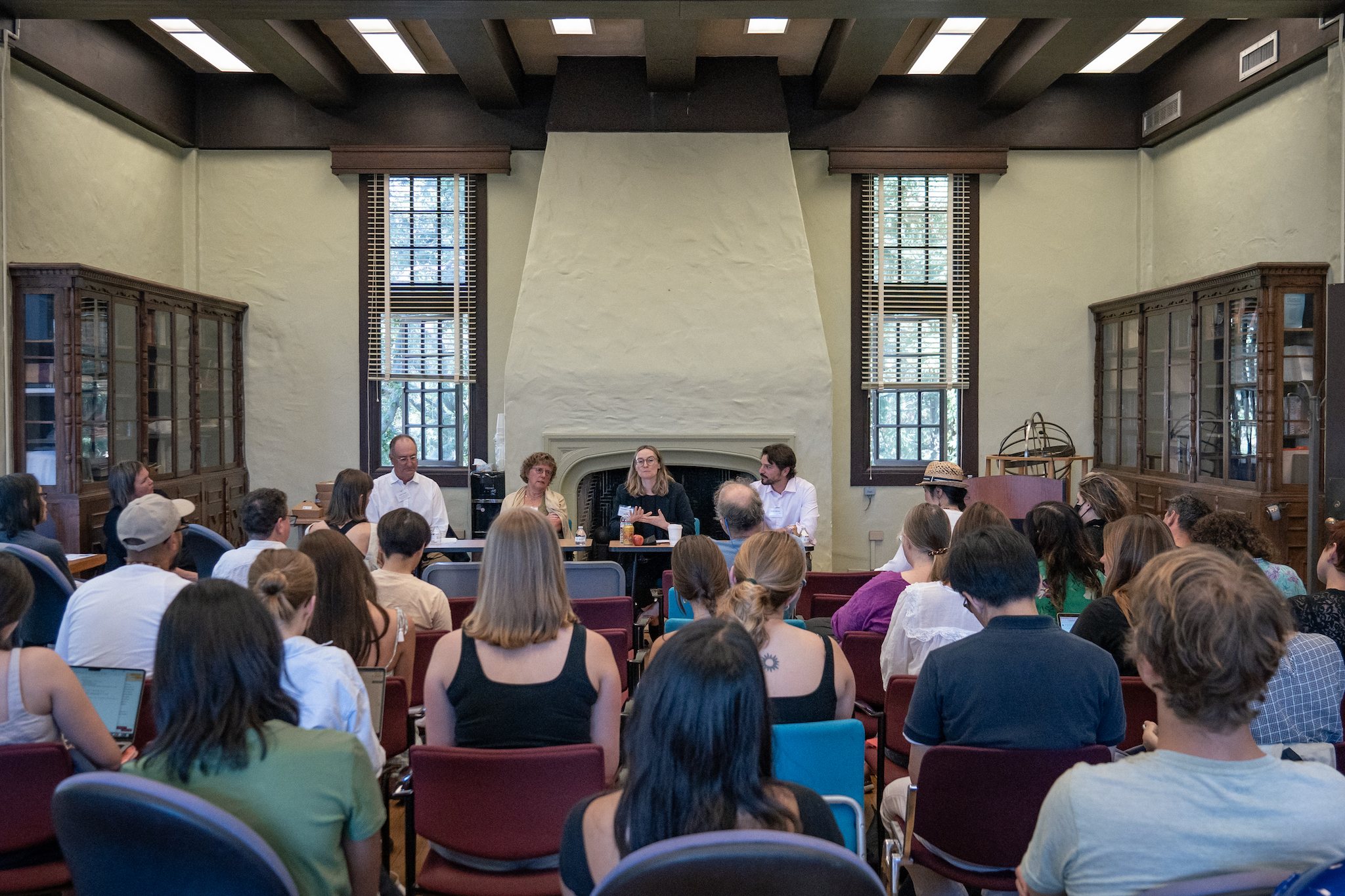
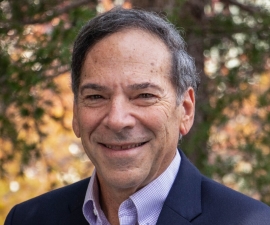
From Berkeley to Trinity via Manhattan: Lecture and Q&A with Eric B. Norman
Tuesday, October 8, 2024 | 12:00–1:00 PM | Banatao Auditorium, 310 Sutardja Dai Hall
Robert Oppenheimer successfully directed the Manhattan Project that led to the creation of the world’s first nuclear weapons. However, two other Berkeley faculty members played crucial roles in this development. Ernest Lawrence’s invention of the cyclotron enabled Glenn Seaborg to discover plutonium and led to the development of uranium isotopic enrichment. In this talk I will describe this work and our group’s investigations to authenticate the first sample of plutonium that was large enough to be weighed and to determine the explosive yield of the “Gadget” through studies of trinitite.
This event is co-presented by the On the Same Page program, the College of Engineering, the Center for Information Technology Research in the Interest of Society (CITRIS), and the student chapter of the American Nuclear Society. Lunch will be provided while supplies last.
Watch the event recording: https://www.youtube.com/watch?v=hPpEa1Fh7ls
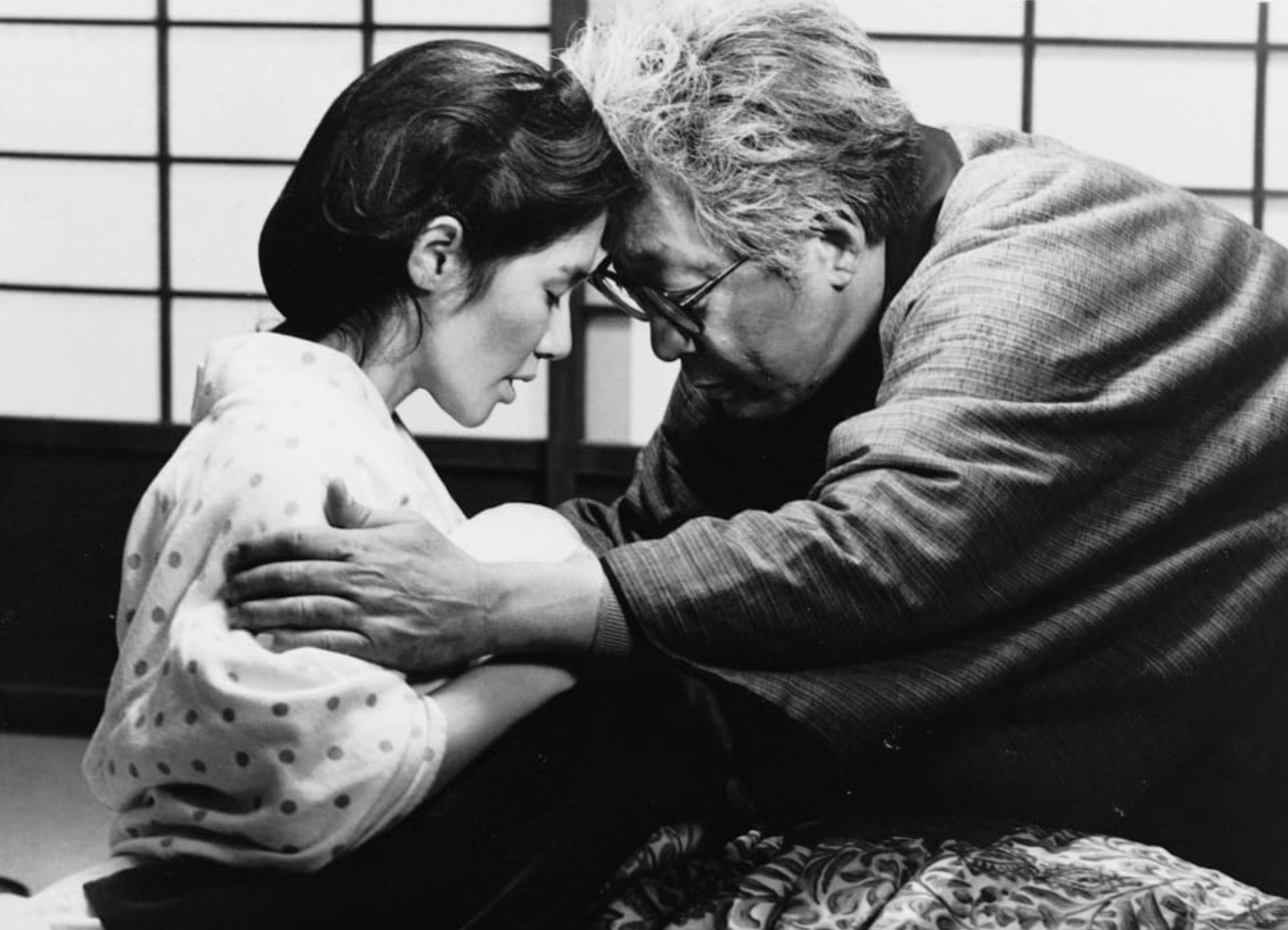
Free Film Screening: Black Rain (黒い雨, Kuroi ame)
Thursday, October 24, 2024 | 5:30 PM (123 mins) | 142 Dwinelle (Nestrick Room)
Shōhei Imamura
Japan, 1989
Yasuko (Yoshiko Tanaka), a young Japanese woman, is in Hiroshima when the U.S. Air Force drops a nuclear explosive on the city. Despite the destruction all around her, Yasuko manages to escape unscathed, and, as other survivors fall ill with radiation poisoning, she is able to stay healthy. But later, when Yasuko goes to live with her uncle Shigematsu (Kazuo Kitamura), who tries to help her start a new life, she finds herself unable to escape the social stigma of radiation sickness.
Read an introduction to the film by Jon Pitt, Assistant Professor of East Asian Studies, UC Irvine →
This event is co-presented by the On the Same Page program and the Center for Japanese Studies. UC Berkeley students, join us before the screening at 5:00 PM for pizza and fizzy water.
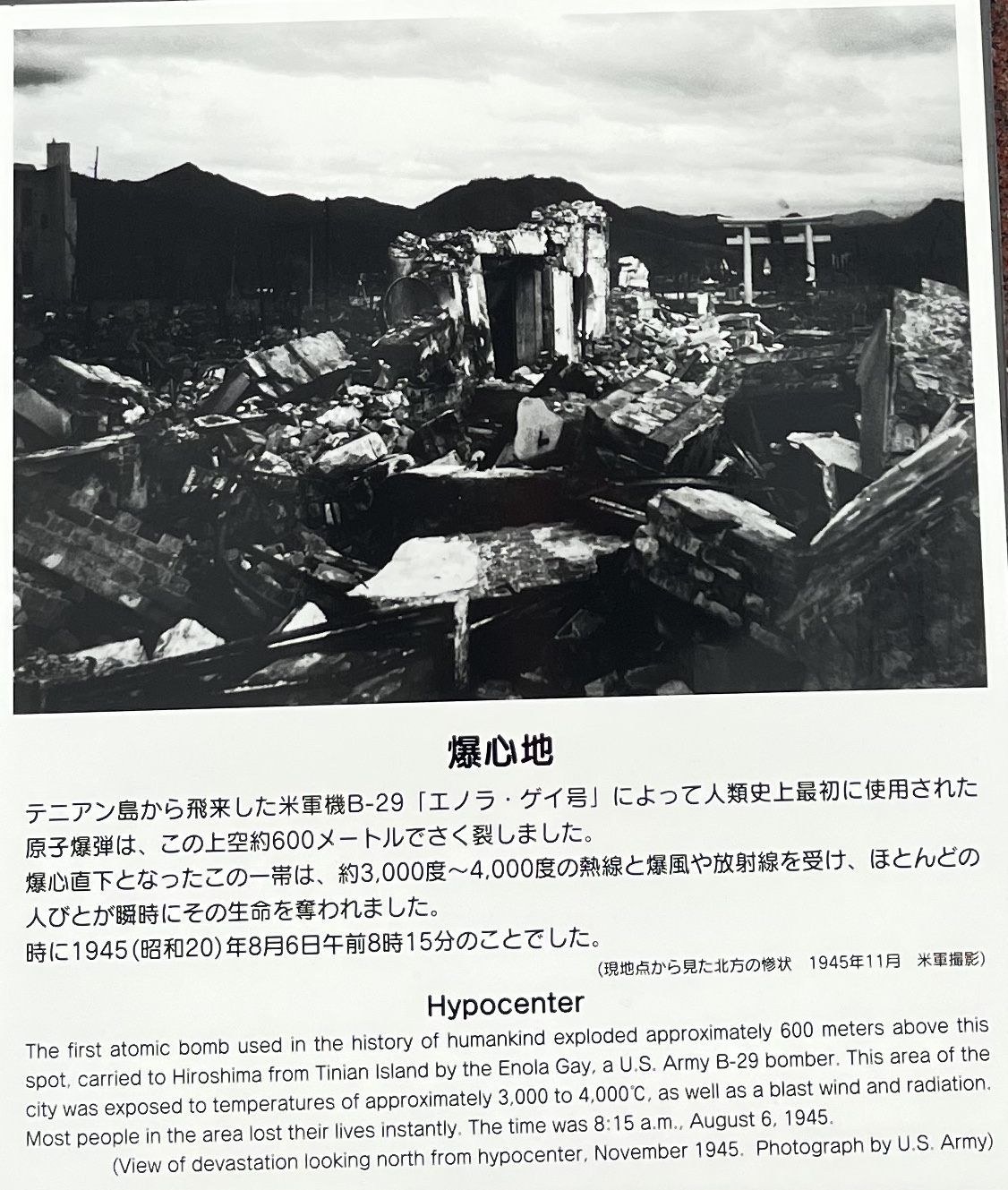
Oppenheimer’s Silences: The View from Japan
Friday, October 25, 2024 | 12:30–2:00 PM | 3335 Dwinelle
Three scholars of Japanese literature and culture present perspectives on the impact of the events depicted in Oppenheimer, rendered invisible in the film. Moderated by Miryam Sas, Professor of Comparative Literature and Film & Media, UC Berkeley.
“Reading Los Alamos, New Mexico in Japanese Literature,” Jon Pitt, Assistant Professor of East Asian Studies, UC Irvine
In this presentation, I discuss how Japanese authors have written about Los Alamos, NM, the birthplace of the atomic bomb. I focus on the relationship between family history and nuclear history in two Japanese writers and reflect on my own familial ties to the Los Alamos National Laboratory.
“Hiroshima and Vietnam,” Brian Hurley, Assistant Professor of Asian Studies, UT Austin
On June 14, 1965, the American writer John Hersey read excerpts from his noted non-fiction work Hiroshima (1946) at The White House Festival of the Arts. By framing his reading as an act of protest against President Lyndon Johnson’s escalation of American involvement in Vietnam, Hersey amplified the concern shared by others at the time that the Vietnam War could turn into a nuclear conflict. This presentation explores how Hersey linked the atomic bombing of Japan in 1945 to subsequent Cold War conflicts in Asia that are rarely read in relation to Hiroshima.
“Oppenheimer’s Silences, Victim’s Voices,” Shelby Oxenford, Assistant Professor of Instruction in Asian Studies, UT Austin
Throughout Oppenheimer, especially in its closing apocalyptic spectacle, where the fires of a nuclear holocaust consume the globe, the actual violence of the nuclear bomb is rendered invisible. Examining a sampling of Japanese films and literature from the bombing of Hiroshima to the nuclear disaster of Fukushima, my talk considers what Oppenheimer made disappear: the stories of victims and survivors.
This event is co-presented by the On the Same Page program and the Center for Japanese Studies. Refreshments will be served.

Lawrence Berkeley National Laboratory Tour
Tuesday, October 29, 2024 | 1:00–5:00 PM | Lawrence Berkeley National Laboratory
Open to UC Berkeley undergraduate students only. Sign-up is first come, first served, with priority given to students who are affiliated with MPS Scholars, Energy and Resources Minor, EOP STEM, Cal NERDS, and L&S 10: The On the Same Page Course.
This event is co-presented by the On the Same Page program and the Lawrence Berkeley National Laboratory.
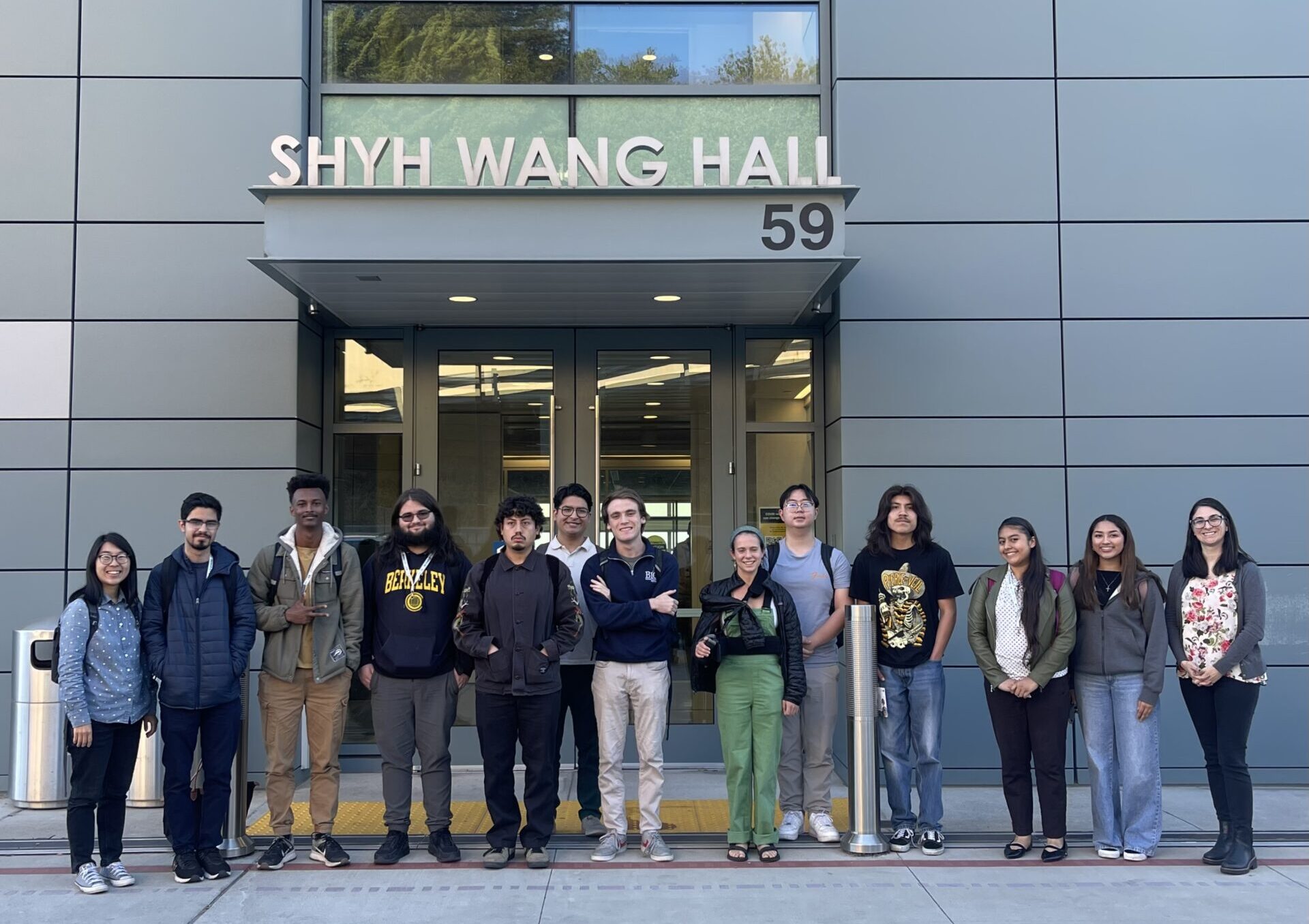
Resources and News
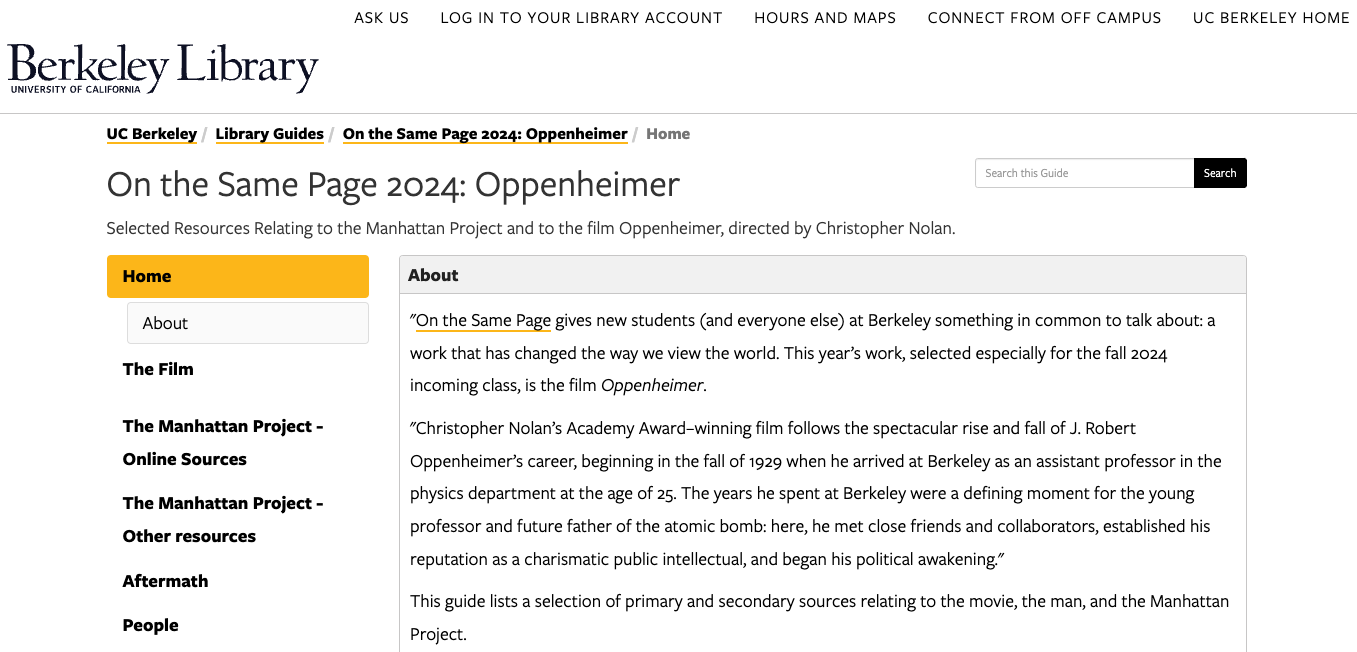
UC Berkeley Library Guide: Oppenheimer
Selected resources relating to the Manhattan Project and to the film Oppenheimer, directed by Christopher Nolan.
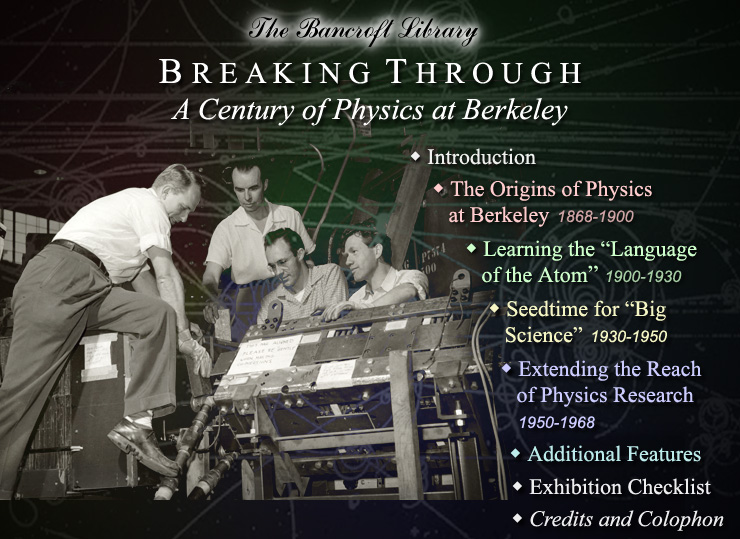
Breaking Through: A Century of Physics at Berkeley
The Bancroft Library’s online exhibit about Oppenheimer at UC Berkeley.

Cal NERDS
The Cal NERDS Program is comprised of a suite of programs and initiatives that provide faculty mentored research opportunities, specialized tech training, graduate school preparation, career coaching, community building, and professional development to high achieving STEM undergraduates and graduate students.

EOP STEM
The EOP STEM Program was created in order to bridge the needs of historically underrepresented students in the Science, Technology, Engineering, and Mathematics fields. By providing one on one support (through the Mentorship Program), leadership opportunities and guidance (through our company visits, the STEM Series, and the Exposure Conference), we aspire to help the next generation of leaders to accomplish their goals and cultivate a new definition for students in STEM.
Biology Scholars Program
At the Biology Scholars Program, we work side-by-side with students to access their untapped talent and create their academic and career blueprints. Our wrap-around multi-pronged approach includes student-centered mentoring, teaching, and alliance.
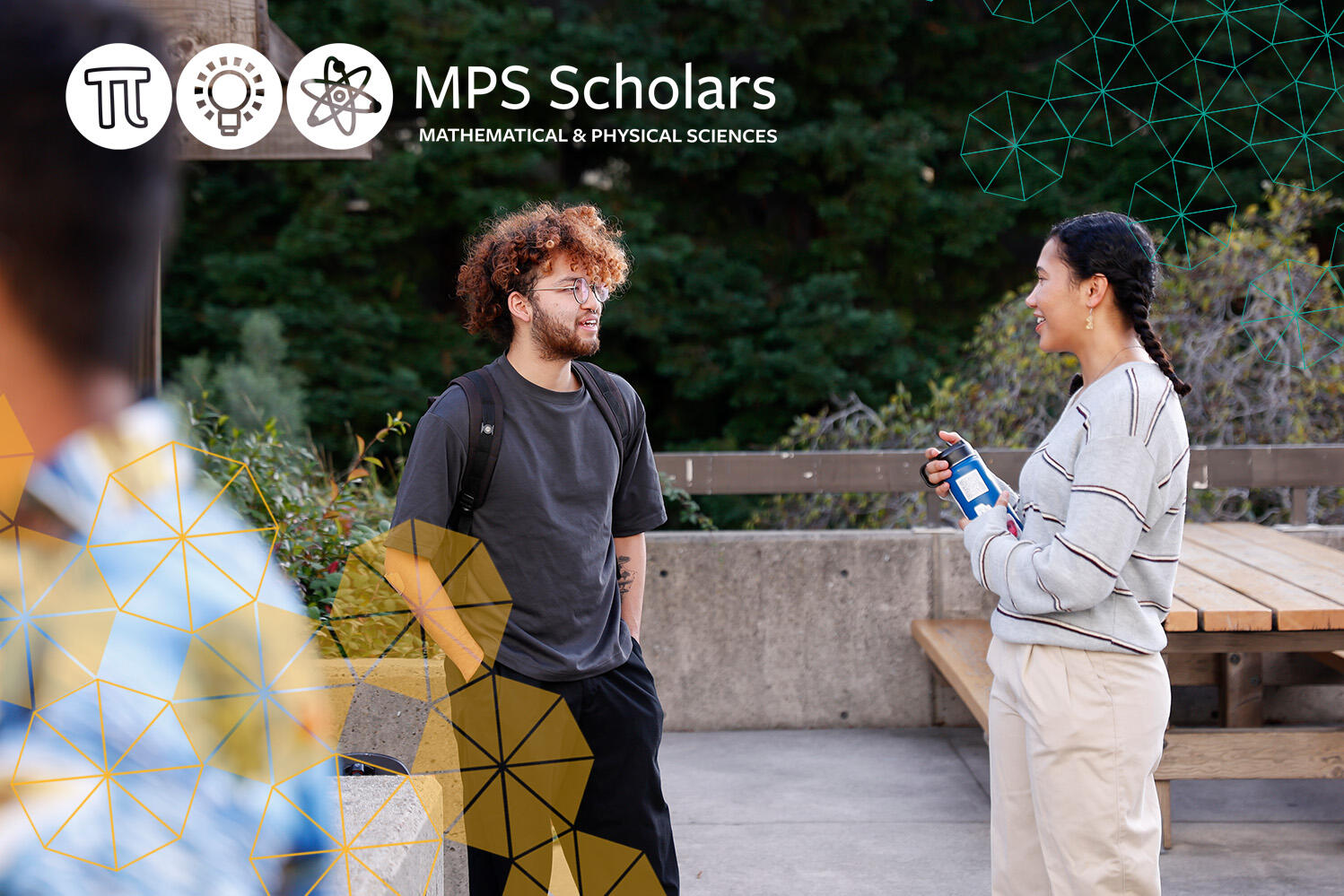
Mathematical & Physical Sciences (MPS) Scholars
Mathematical & Physical Sciences (MPS) Scholars is designed to achieve equitable outcomes for all undergraduates who are interested in the mathematical and physical sciences.

Center for Science, Technology, Medicine, & Society (CSTMS)
As a laboratory for the 21st century university, the Center for Science, Technology, Medicine and Society (CSTMS) conducts cross-disciplinary research, teaching, and outreach on the histories and implications of scientific research, biomedicine, and new technologies.

Undergraduate Minor in Science, Technology and Society (STS)
The STS Minor provides students critical thinking skills to effectively contribute to a world shaped by computing and artificial intelligence, environmental change, new medical technologies, and genetic engineering.
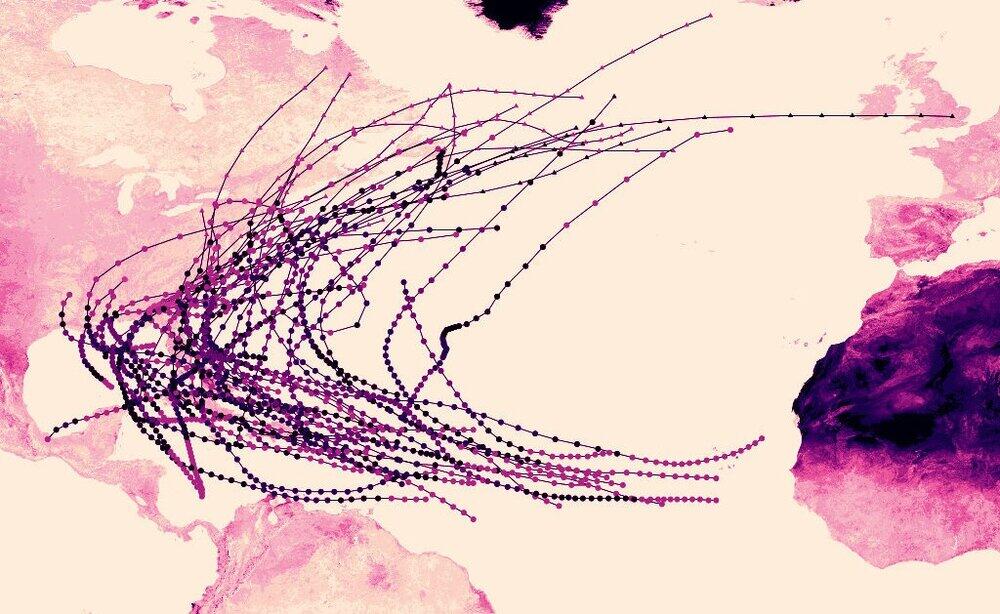
Sciences and Society Course Thread
Watch Professor of Anthropology Cori Hayden’s introduction of the thread: http://youtu.be/jcRlY8K6aNg

Center for Japanese Studies
The Center for Japanese Studies supports and promotes an encyclopedic array of research and teaching related to Japan; we also support the study of historic and contemporary connections between Japan and Japanese Americans.

Lawrence Berkeley National Lab
At Lawrence Berkeley National Laboratory, our mission is to expand the frontiers of knowledge and deliver solutions for science and humankind. LBNL is a U.S. DOE Office of Science national laboratory managed by the University of California.
Oppenheimer’s Pre-War Years at UC Berkeley
Saturday, October 7, 2023 | 4:00–5:00 PM | 105 Stanley Hall
Oppenheimer’s Berkeley Years: Pioneering Research & Personal Legacy
Friday, July 28, 2023 | 11:30 AM–1:00 PM | Chevron Auditorium at International House
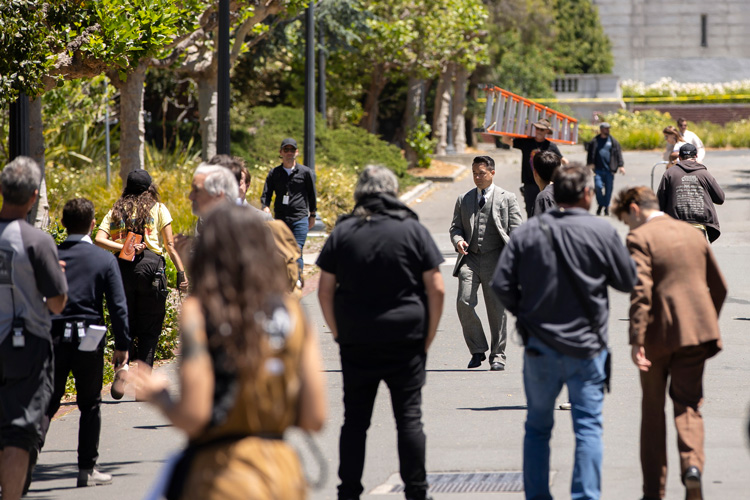
Film crew sends UC Berkeley back to the 1940s
June 2, 2022 | By Public Affairs
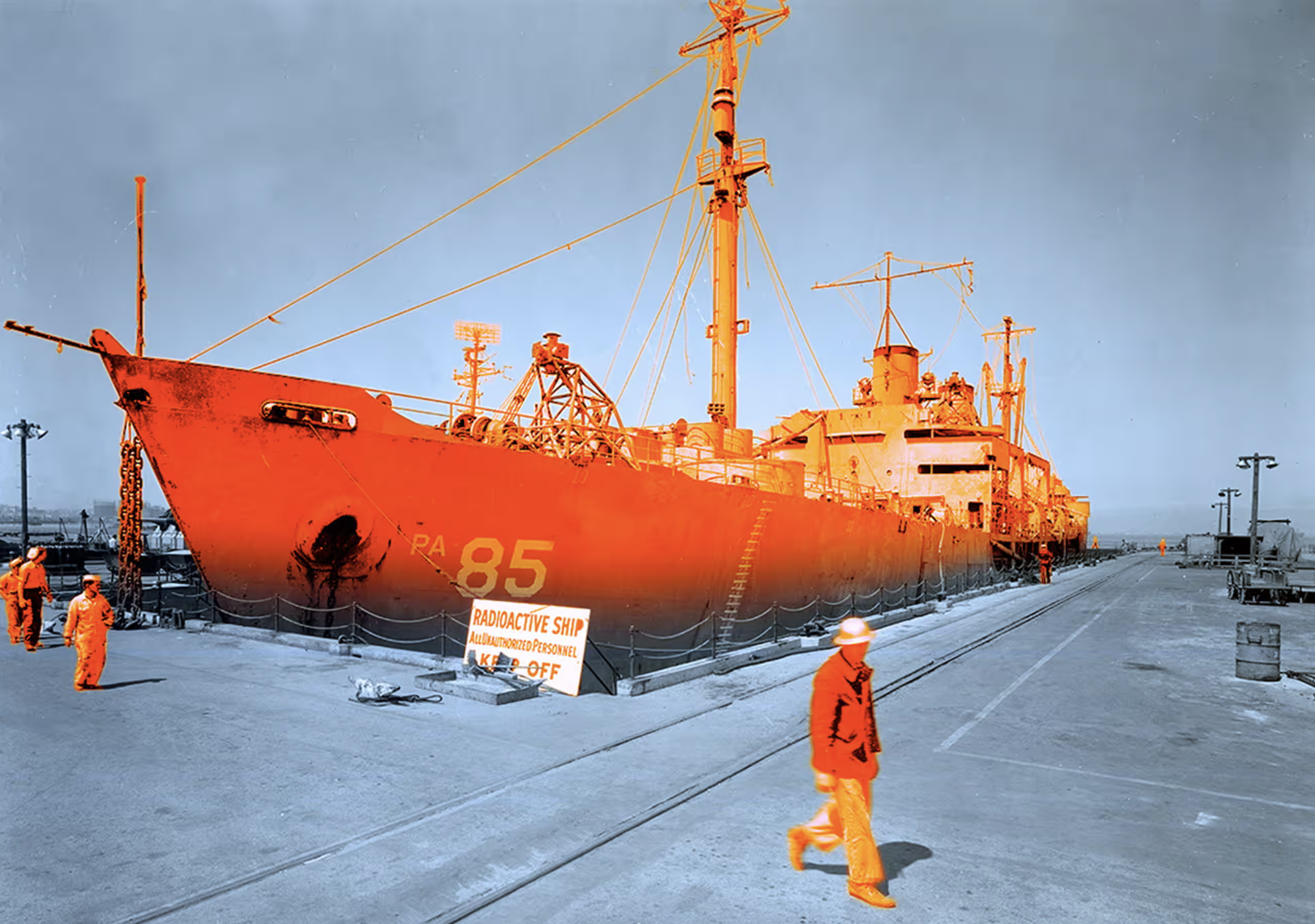
Revealed: how a San Francisco navy lab became a hub for human radiation experiments
By Chris Roberts, San Francisco Public Press | The Guardian | November 25, 2024
Read more: Exposed: The Human Radiation Experiments at Hunters Point
Courses
Dive deeper into the themes of this year’s selection through coursework. This year’s courses are offered through American Studies, History, Engineering, Physics, and others across campus.
Spring 2025 Courses
ANTHRO 171: Japan, Mikiko Soga
This course offers an introductory survey of Japan from a four-field anthropological perspective. It is open without prerequisite to anyone with a curiosity about what is arguably the most important non-Western society of the last 100 years, and to anyone concerned about the diverse conditions of modern life. We will range over many aspects of contemporary Japan, and draw on scholarship in history, literature, religion, and the various social sciences.
ASAMST 122: Japanese American History, Lisa S Hirai Tsuchitani
This course will be presented as a proseminar with selected topics in order to give students an opportunity to participate in the dynamics of the study of Japanese American history. Topics include immigration, anti-Japanese racism, labor, concentration camps, agriculture, art and literature, and personality and culture.
COLWRIT R1A 001: Accelerated Reading and Composition: Writing at the End of the World, David Jamieson
Whether it is the threat of nuclear warfare, impending climate disaster, or the apocalyptic prophecies of various religious traditions, anticipating the imminent end of the world is a mode of thinking that is seeded deep within the collective consciousness of many civilizations. For thousands of years, the apocalypse has supposed to have been right around the corner, and anxieties surrounding its approach have manifested in fiction, film, poetry, politics and, more recently, computer science. Will nuclear weapons or climate upheavals render the world into a Mad Max-like hellscape? Will ChatGPT attain consciousness and wipe out humanity in order to protect its own existence? More importantly, what do these questions and depictions tell us about the cultures that are asking them? In this course you will learn to read and write as a way of participating in an intellectual community, both at Cal and beyond. You will learn to use writing as a way of thinking. Rather than approaching writing as some mystical, innate affinity with words, this course approaches writing as a craft that can be learned and developed.
ENGIN 11: A Hands-on Introduction to Radiation Detection: Getting to know our Radioactive World, Ali Hanks
Introduction to basic concepts in radiation detection and radioactivity, electrical circuits, and data analytics. Lectures provide the theoretical foundation of the work being performed in the accompanying laboratory. The course will contain three sections: introduction to how radiation interacts with matter and radiation detection technologies; development of the tools (mathematical and computational) needed for analyzing various types of radiation and environmental data; and building of a basic radiation sensor system.
IAS 157AC: Engineering, The Environment, and Society, Khalid Kadir
This course engages students at the intersection of environmental justice, social justice, and engineering to explore how problems that are commonly defined in technical terms are at their roots deeply socially embedded. Through partnerships with community-based organizations, students are trained to recognize the socio-political nature of technical problems so that they may approach solutions in ways that prioritize social justice. Topics covered include environmental engineering as it relates to air, water, and soil contamination; race, class, and privilege; expertise; ethics; and engaged citizenship. This course cannot be used to complete any engineering technical unit requirements.
JAPAN 7B: Introduction to Modern Japanese Literature and Culture, Jonathan E Zwicker
An introduction to Japanese literature in translation in a two-semester sequence. 7B provides a survey of important works of 19th- and 20th-century Japanese fiction, poetry, and cultural criticism. The course will explore the manner in which writers responded to the challenges of industrialization, internationalization, and war. Topics include the shifting notions of tradition and modernity, the impact of Westernization on the constructions of the self and gender, writers and the wartime state, literature of the atomic bomb, and postmodern fantasies and aesthetics. All readings are in English translation. Techniques of critical reading and writing will be introduced as an integral part of the course.
NUCENG 24: Freshman Seminars: How It’s Made, Peter Hosemann
This class is an introduction to the conventional manufacturing techniques of components used in nuclear and other engineering applications. An introduction to metal fabrication will be given, including, but not limited to, a brief introduction to refining, casting, forming, machining and joining. After an overview of the techniques available to engineers, the students will be expected to perform a literature review and discuss how specifically chosen components can be manufactured. In addition, the students will be encouraged to participate in the campus-offered machine-shop training where basic skills in machining are taught after a short introduction by the professor to the shop tools.
NUCENG 24: Freshman Seminars: Everything You Ever Wanted To Know About NUC ENG But Were Afraid To Ask, Eric B Norman
Have you ever wondered how a nuclear power plant produces electricity, or what makes a nuclear bomb explode, or how radiation can both cause and treat cancer? What caused the nuclear disaster at Fukushima? What powers the Perseverance rover on Mars? In this seminar, we will examine the basic science behind these and other topics and explore the engineering methods that underlie such technologies. Seminar is open to all interested freshmen.
PHYSICS 10: From the Quantum Universe to Quantum Technologies, Barbara V Jacak
The most interesting and important topics in physics, stressing conceptual understanding rather than math, with applications to current events. Topics covered may vary and may include energy and conservation, radioactivity, nuclear physics, the Theory of Relativity, lasers, explosions, earthquakes, superconductors, and quantum physics.
This course will provide an introduction to the fascinating mysteries and applications of quantum mechanics, for both nonscience and science majors. We will start with an introduction to particle-wave duality and quantum mechanics. We will discuss our quantum universe of atoms and nuclei, and learn about nuclear fusion and fission, energy production, and how stars work. We will explore novel quantum technologies, particularly quantum information, computing, and quantum sensors, which are all amazing new applications of quantum physics. This course will stress conceptual understanding rather than math, and give you new insights into some of the most modern technologies being developed right now. You will develop your skills in logical, physical reasoning and apply them to some of the issues facing humanity right now.
PUB POL 190/290: Special Topics in Public Policy, Janet Napolitano
The National Security and Intelligence Seminar is a three unit elective course that combines several papers with a once a week special topic seminar with intelligence and security practitioners from the national security community. Guided by former Secretary of Homeland Security, Janet Napolitano, this practitioner-led seminar will examine the policy, players, and factors shaping the 21st century geostrategic landscape, as reflected in contemporary media headlines. Aided by the lived experiences of former intelligence operatives and policy practitioners, students will debate the implications of variables such as emerging technology, cyber security, climate change, and political instability and how these and other variables increasingly influence the nature and complexity of the global security environment. The seminar will endeavor to debunk, demystify, and distinguish fact from fiction on topics like: The Future of Space is Now; Frontier Tech & Innovation (AI, Biotech, Semiconductors); Ukraine v. Russia; Great Power Competition, and more. The course will also incorporate select site visits in the bay area and will conclude with an onsite simulation exercise. This course is limited to 20 students and is open to all UC Berkeley students, with a limited number of spots for undergraduates available. Students from all departments on campus are encouraged to apply. Priority will be given to students who are pursuing an area of security studies as part of their degree and to those who are interested in pursuing a career in public service.
Fall 2024 Courses
L&S 10: The On The Same Page Course, Aileen Liu
This is a course for new students (freshmen or transfers) who would like to engage with the On the Same Page book or theme for their year in a more in-depth way than the average student might. They will take full advantage of the On the Same Page events and programming planned for the fall of each year, and will enjoy opportunities to discuss the book or theme with faculty and fellow students.
AMERSTD 10: Introduction to American Studies: Going Nuclear, Christine Palmer, Mark Brilliant
From the moment that scientists first split the atom in the 1930s, “going nuclear” has conjured up dystopian fears alongside utopian hopes—from mushroom clouds, reactor meltdowns, Superfund sites, and planetary annihilation, on the one hand, to cancer treatment, war deterrence, job creation, and planetary salvation through clean energy, on the other hand. Through an exploration of these and other examples of the utopian/dystopian (or, hopeful/frightful) understandings of “going nuclear” in twentieth century American history and culture, this course will introduce students to the concepts and methods of American Studies as an interdisciplinary field of study.
COLWRIT R1A 017: Perspective-Taking: (How) Can We (Ever) Reach Common Ground?, Michelle Baptiste
This interactive experiential course focuses on “Perspective-Taking: (How) Can We Reach Common Ground?” We’ll delve into the lives of two complex individuals: Robert Oppenheimer and George Floyd, as well as explore tense opposing perspectives on current events: the mining controversy at Oak Flat on Apache Land as well as the influential US presidential election. You will engage in discussions of science and ethics, politics and law, racism and activism, civil rights and indigenous land rights, mainstream media and social media, education and democracy, technology and medicine. As a member of a community of writers, you will have the opportunity to write from these different angles to interpret what most interests you in each text – crafting a film analysis after viewing UC Berkeley’s On the Same Page selection: the movie Oppenheimer and then writing text analysis essays on two books – one a cradle-to-grave biography and another that combines diverse written genres while also weaving in illustrations; finally, you’ll use Lakoff’s nation as family metaphor theory as a lens through which to compose a rhetorical analysis comparing two politicians’ speeches. Ultimately, you will revise selected pieces to design and publish a reflective multimodal portfolio showcasing your best work of the course!
DATA C104: Human Contexts and Ethics of Data – DATA/History/STS, Cathryn Carson, Ari S Edmundson
This course teaches you to use the tools of applied historical thinking and Science, Technology, and Society (STS) to recognize, analyze, and shape the human contexts and ethics of data. It addresses key topics such as doing ethical data science amid shifting definitions of human subjects, consent, and privacy; the changing relationship between data, democracy, and law; the role of data analytics in how corporations and governments provide public goods such as health and security to citizens; sensors, machine learning and artificial intelligence and changing landscapes of labor, industry, and city life. It prepares you to engage as a knowledgeable and responsible citizen and professional in the varied arenas of our datafied world.
ENGIN 125: Ethics, Engineering, and Society, Karl A Van Bibber
How should engineers analyze and resolve the ethical issues inherent in engineering? This seminar-style course provides an introduction to how theories, concepts, and methods from the humanities and social science can be applied to ethical problems in engineering. Assignments incorporate group and independent research designed to provide students an opportunity to contribute novel findings to the emerging field of engineering ethics while building their analytical and communication skills. This course cannot be used to fulfill any engineering technical requirements (units or courses).
HISTORY 14: Introduction to the History of Japan, Andrew E Barshay
This undergraduate survey course will introduce students to the history of the Japanese archipelago, from antiquity to the present day, with a special focus on regional contacts, internal developments, and global exchanges. Beginning with the pre-textual archaeological record, we go on to explore the introduction of rice agriculture, Chinese writing and forms of political organization, and Buddhism as these culminated in the high aristocratic cultures of Nara and Heian. We then turn to the development of warrior (samurai) culture, the emergence and persistence of warrior rule in its successive phases. Particular attention will be given to the Tokugawa/Edo period, the flourishing of popular culture, the indigenous sources of Japanese industrialization and modern economic development, and the border and frontier interfaces of Edo Japan with China, Korea, the Ainu, the Ryukyus, and Europe. These considerations will form the basis for an interpretation of the Meiji restoration, the formation of the Japanese empire, and the regional conflicts leading to WWII and Japan’s defeat and surrender. In the final phase of the course we will discuss the postwar (or post-imperial) era and its extension into recent decades. This course is also intended to introduce students to some fundamental techniques of historical research and analysis and to major critical approaches to historical sources in general and those of Japanese history in particular. Course readings will include a wide range of primary sources (translated from Japanese into English) along with selected secondary (interpretive) materials. The course will offer students the opportunity to improve their academic writing and research skills while familiarizing themselves with the history of Japan.
HISTORY 30: Science and Society, Jordan Thomas Mursinna
Science as we know is the product of a historical process. In this course, we will explore the origins of its concepts, practices, goals, and cognitive authority by surveying its roots in their diverse social and cultural settings. We will trace the development of conceptions of the natural world from antiquity through the Middle Ages up to the Scientific Revolution and the Enlightenment. In this way, we’ll study the relations of modern science to other forms of knowledge—magical, religious, and philosophical. Our considerations will have a truly global reach, and all the main branches of science and technology fall within our purview.
HISTORY C187 / LS C140V: The History and Practice of Human Rights, Stefan-Ludwig Hoffmann
What are human rights? Where did they originate and when? Who retains them, and when are we obliged to defend them? Through what kinds of institutions, practices, and frameworks have they been advocated and affirmed? And which are the human rights that we take to be self-evident? The rights to speak and worship freely? To legal process? To shelter and nourishment? Is health care a human right? If so, can human rights ever be global in scope? Or is the idea of universal human rights a Eurocentric delusion or, worse, a neoliberal ploy? History will not answer these questions for us, but historical understanding can help us answer them for ourselves. With a focus on the last two centuries, and especially the late twentieth century to the present, “The History and Practice of Human Rights” offers historical perspective on some of today’s most challenging issues, from state violence, military intervention, and international justice, to inequality, corporate abuse and environmental disaster. Much of our analysis of these topics will center on the law, but we will also consider how the media and social movements have influenced the emergence of human rights thought and practice around the world.
HISTORY C182C / ISF C100G / STS C100: Introduction to Science, Technology, and Society, Shreeharsh Kelkar
This course provides an overview of the field of Science and Technology Studies (STS) as a way to study how our knowledge and technology shape and are shaped by social, political, historical, economic, and other factors. We will learn key concepts of the field (e.g., how technologies are understood and used differently in different communities) and apply them to a wide range of topics, including geography, history, environmental and information science, and others. Questions this course will address include: how are scientific facts constructed? How are values embedded in technical systems?
NUCENG 100: Introduction to Nuclear Energy and Technology, Guanyu Su
The class provides students with an overview of the contemporary nuclear energy technology with emphasis on nuclear fission as an energy source. Starting with the basic physics of the nuclear fission process, the class includes discussions on reactor control, thermal hydraulics, fuel production, and spent fuel management for various types of reactors in use around the world as well as analysis of safety and other nuclear-related issues. This class is intended for sophomore NE students, but is also open to transfer students and students from other majors.
PHILOS 5: Science and Human Understanding, Ezra Rubenstein
Introduction to the Philosophy of Science.
PHILOS 104: Ethical Theories, Nicholas G Kolodny
The fundamental concepts and problems of morality examined through the study of classical and contemporary philosophical theories of ethics.
PHYSICS 24: Big Science, Steven M Kahn
This seminar will examine the characteristics and implications of “big science” experiments, i.e. those with costs at the level of several hundred million dollars or more. How and why have experiments grown to this scale? How do such experiments get born? How do they get funded? How are they managed? What are the effects (positive and negative) on the sociology of science at this scale? Some of the big experiments discussed in class are: James Webb Space Telescope-NASA, Laser Interferometric Gravitational Wave Observatory (LIGO), Human Genome Project, etc. Prerequisites: Students with some scientific background, either in the mathematical and physical sciences, the biological sciences, or in engineering. Students should have an interest in some of the larger societal aspects of science.
POLSCI 124M: The Scientific Study of International Conflict, Michaela Mattes
The goal of this upper-level seminar is to familiarize students with the scientific approach to studying international conflict, provide them with a deep understanding of the basic factors that exacerbate or mitigate international conflict, and sharpen students’ analytical and research skills.
PUBPOL 155: Introduction to Security Policy, Daniel J Sargent, Janet Ann Napolitano
This course introduces students to the arena of security policy. Students will learn the origins and evolution of the governing framework for security policy in the United States, including the post-9/11 creation of Homeland Security, and key methodologies of security policy, including risk assessment. The course will evaluate the variety of scales at which security policy is enacted, from state/local to federal and even international. The course delves into defining security dilemmas of the present: the challenge of securing democracy against both internal and external threats; the challenge of cybersecurity in a networked world; and global climate change. The course concludes with a required one-day crisis simulation exercise.
PUBPOL 190: War? Emerging Technologies & National Security Policy, Andrew W Reddie
Course examines current problems and issues in the field of public policy. Topics may vary from year to year and will be announced at the beginning of the semester. Open to students from other departments.
SOCIOL 166: Society and Technology, Joseph Klett
This course studies the interaction between society and technologies in a comparative and multicultural perspective. Some topics covered include the relationship between technology and human society; technology, culture and values; technology in the new global economy; development and inequality; electronic democracy; how technology has transformed work and employment; and the challenges of technological progress and the role that society plays in addressing these challenges.

Faculty Planning Committee
Faculty with expertise in the themes of this year’s selection, from a wide range of disciplines, plan engaging events and activities for students throughout the academic year. In previous years, the faculty planning committee has organized panels, roundtables, film screenings, concerts, faculty dialogues, karaoke nights, contests, and more.
If you would like to join our efforts, please email Aileen Liu.
Acknowledgments
Selection Committee
David Ackerly, Environmental Science, Policy, and Management, and Integrative Biology
Stephen Best, English and Film & Media
Elisa Diana Huerta, Centers for Educational Justice & Community Engagement
Corliss Lee, Library
Oliver O’Reilly, Mechanical Engineering
Aileen Liu, Chair, Director of Curricular Engagement Initiatives
Student Reviewers
Alaina Delsignore, Alexa Gutierrez Reyna, Carina Kim, Chris Harjadi, Daniela Arreola, Kierstyn Cohen, Kuldeep Dungarwal, Lucille Lorenz, McKinley Keys, Muhammad Ibrahim Noon, Nichelle Wong, Niki Ebrahimnejad, Prab Kaur, Samantha Lindsay, Sardaana Eginova, Sofia Gonzalez, and Zeyu Hou
Volunteers
Carolyn Clark, Laura Demir, Sara Larsen, Chelsea Prieto, Jessica Stewart, and Bibi Zaragoza
Special thanks to Sandra Eder, Junko Habu, Kumi Sawada Hadler, Sonya Lee, Davinder Sidhu, and Belinda White
